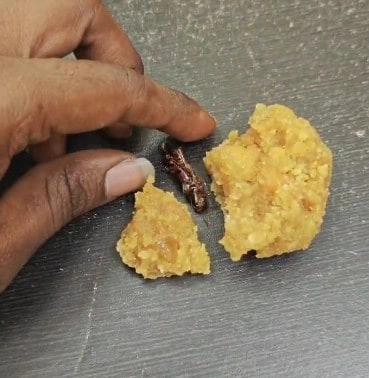In a surprising incident that has drawn attention, a man has come forward claiming that he discovered a cockroach in a ‘laddoo’ offered as prasad at a temple in Andhra Pradesh. This allegation has sparked outrage and concern among devotees who frequent the temple, as the sanctity of religious offerings is of utmost importance in such places. The laddoo, a popular sweet made from flour, sugar, and ghee, is often distributed to worshippers as a symbol of blessings. The man’s claim raises significant questions about hygiene and food safety in religious institutions, where devotees expect not only spiritual fulfillment but also the assurance that the food offered to them is prepared and served in a clean environment.
In response to these allegations, an official from the temple has categorically denied the man’s claims, asserting that proper measures are in place to ensure the quality and safety of all offerings. The temple authorities have expressed their commitment to maintaining high standards of cleanliness and hygiene, especially given the large number of visitors the temple attracts daily. They have stated that the prasad is prepared under strict supervision, and regular inspections are conducted to prevent any contamination. This denial from the temple officials aims to alleviate concerns among the public and reassure devotees that their faith in the temple’s practices is not misplaced.
The situation has ignited a broader conversation about food safety in religious settings, highlighting the need for stringent health regulations and monitoring. Many devotees are now calling for increased transparency regarding the preparation and distribution of prasad in temples. This incident serves as a reminder of the delicate balance that must be maintained between religious practices and public health standards. As the discussion unfolds, it underscores the importance of accountability and vigilance in ensuring that sacred traditions are upheld without compromising the health and safety of the community. Overall, this incident may lead to a reevaluation of food safety protocols within religious institutions, aiming to restore trust and confidence among devotees.




